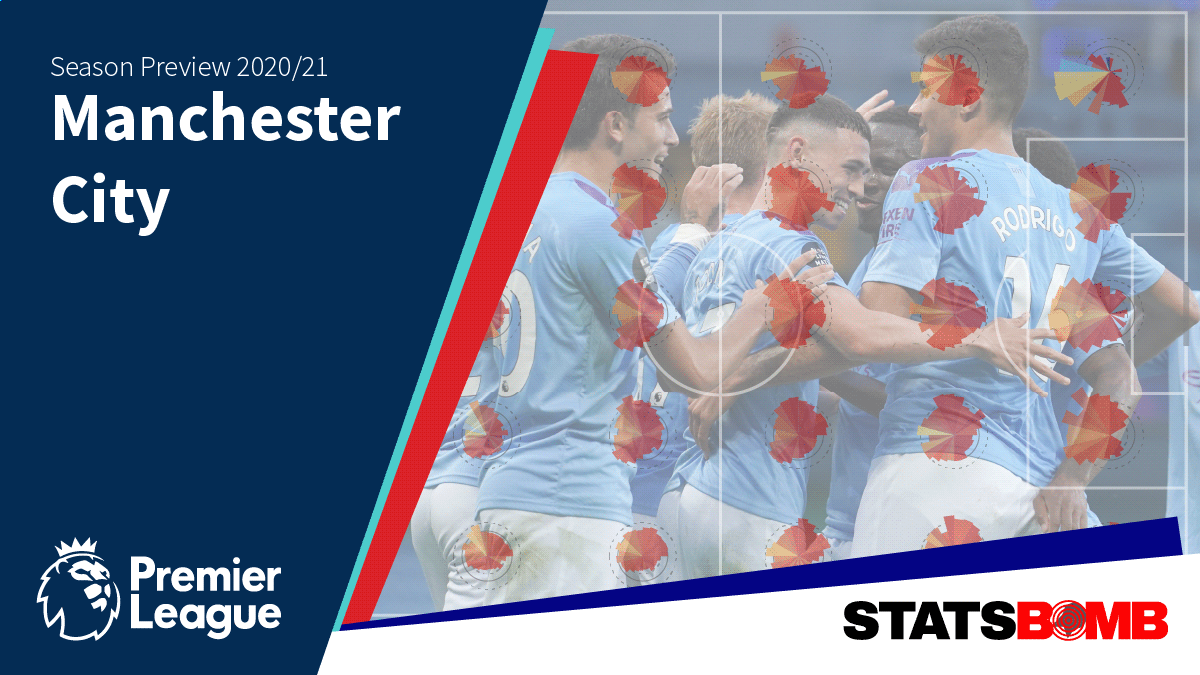Will this be the last season we see Pep Guardiola in English football? If it is, the rest of the title-aspirants will not mourn his departure. Arguably it’s become harder than ever to win titles during his tenure. Of course, City only have two titles from his four seasons as Antonio Conte’s Chelsea took the top prize in 2016-17 and Liverpool won it last time round. Within this era, five of the six highest points totals in the Premier League era exist: two each for City (100 in 2017-18 and 98 in 2018-19) and Liverpool (97 in 2018-19 and 99 in 2019-20) and Chelsea’s 93 in 2016-17. Is this the new normal? Or will we see a decline if Guardiola departs? What is certain is that the combination of it possibly being his last season in Manchester plus a comparatively mediocre 81 points last season should be adequate motivation for Guardiola to set about reclaiming the title. To the consternation of some, once more, the metrics were extremely good but the outcomes were decidedly split. Two Manchester Cities operated in 2019-20. One version laid waste to defences and racked up simple, dominant wins without needing to get out of second gear. Watford gave up twelve goals in two defeats, Villa, Brighton and Burnley all gave up nine. Elsewhere, they couldn’t best Manchester United or Wolves across two games, and contrived to lose to Norwich. The sheer weirdness of annihilating Tottenham twice yet getting just one point can be filed under “football has elements of randomness” too. For the record in those two games, they recorded 48 shots to Tottenham’s 6, and a huge 6.3 to 0.5 in expected goals. Even in defeat, frequently, the elements of good process were right there. Some of the most eyecatching defeats involved red cards. The 3-2 defeat to Wolves at Christmas showed all their quality--they went 2-0 up despite losing Ederson in the 11th minute before giving up the lead late on. Not good was Chelsea’s convincing 2-1 June victory was helped by Fernandinho’s 73rd minute dismissal from where the Blues turned the screw and City didn’t muster a shot. March’s 2-0 defeat to United was pretty tepid too. As ever they dominated the ball but unusually created very little (just seven shots). The bottom line is that City’s record against teams in the eventual top seven (usual big six plus Leicester) was insufficient to see them challenge long and late into any season, let along one in which Liverpool barely dropped points. With a record of 4-1-7 with five out of six away defeats here, City just weren’t able to consistently dominate and beat the better teams in this league. This is where they were so strong in the previous two seasons (9-1-2 in 2017-18 and 9-2-1 in 2018-19) and where they faltered in Guardiola’s first season (2-5-5). 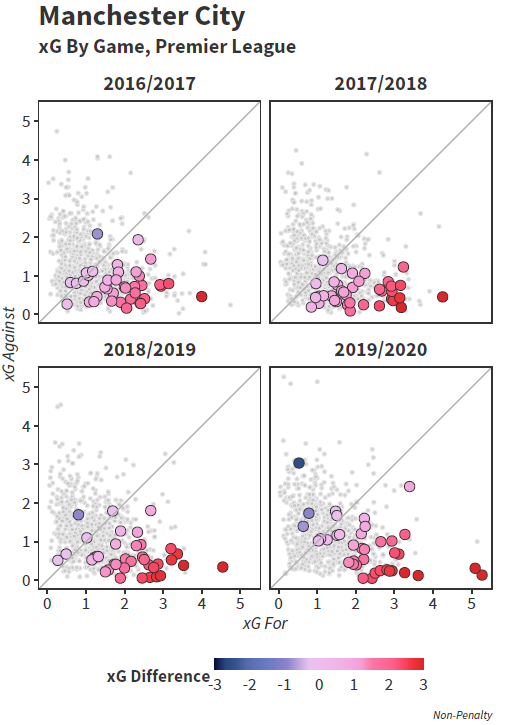 In the big picture, City's metrics were great; but then again they always are. But when we drill down to game by game (as the chart above shows) we can see that City's problem was as much aligned to the variation in their performance levels in games as anything else. Look at 2017-18: nearly no games with over one expected goals allowed and only one game in which their total was exceeded. 2018-19 was pretty good too but with a smattering of games in which the defence looked more vulnerable. 2019-20 has a weird mix of high xG for/low xG against games and a bunch of matches in which the team is either outperformed, gives up a lot in defence or it's pretty close. Bottom line, there was less consistency and that's partly how they contrived to lose nine games having only lost twelve combined in the previous three seasons. The dichotomy between both shot quantity and shot quality at both ends of the pitch was fairly remarkable too. As ever City took a lot of shots. Their 19.5 per game was higher than any of their previous seasons and evoked Carlo Ancelotti's 2009-10 Chelsea team, which was the last Premier League team to get anywhere near this kind of volume. They were good shots too, with the xG per shot value of close to 0.12 only a rizla-width behind that of Arsenal's own 0.12. Loads of shots of very good quality equals loads of goals, 102 in fact, which tied their 2013-14 total and was only four goals behind that of 2017-18. As ever, all their attackers had decent contributory seasons, and eight different players played more than 900 minutes and contributed between 0.49 and 0.98 goals (or assists) per 90 minutes. It's daft really. The varying outcomes and lack of Champions League success will mean that it may take time to really reflect adequately on what Guardiola created in this team, but the attacking unit remains utterly stellar. But the defence. The defence. Seven shots against was up from six in the previous two seasons. Such volume remains are ludicrously good and again speaks of good process. However, the value of these shots was league high at 0.12, significantly up from all of Guardiola's three previous seasons and essentially the same value as the shots they were taking. So Manchester City, one of the best attacking teams in world football, gave up the same shot quality as they take themselves. That's a problem. Throughball vulnerability was a part of this. Across 2017-18 and 2018-19 City gave up 21 shots from throughballs and three goals. In 2019-20 alone they allowed the same volume of shots against (21) but this time gave up seven goals. This kind of vulnerability is a frequent weak spot for pressing teams, and it is to City's credit that they managed to resolve a weakness here after Guardiola's first season.. 2019-20 was not successful here though, and Kyle Walker and Ederson apart, the whole backline has felt erratically assembled for a while. The obvious switch at the back was that (then) 34 year old defensive midfielder Fernandinho was now a starting centre back, and with Aymeric Laporte out, the rotation grew more frequent. A stalwart back in 2017-18, Nicolas Otamendi has become a player who is in and out of the team while John Stones appeared to fall right down the pecking order with Eric Garcia ending the season with a bunch of starts. Stones' demise is curious but possibly not undeserved. An experimental metric I calculated to establish how frequently defenders were actively clearing their defensive zones versus the amount of successful plays their opponents were making saw him rank dead last of all centre backs in the league, and by some margin. As the new man in midfield, Rodri was eyed as a potential culprit towards this new found defensive instability, with ideas that he had yet to perfect the dark arts of Fernandinho, but this was pretty speculative. On top of this City once more conceded some very stupid goals, twice seeing Ederson bypassed from 40 yards or so, from Che Adams and Scott McTominay respectively. Mo Salah did the same a couple of years back and they're such horrible goals to give up, one would think that there were tweaks that could be added to the philosophy just to avert this. Personnel For a club that has spent widely, and acquired Raheem Sterling and Kevin De Bruyne in one summer window back in 2015 there's a nagging feeling that in recent seasons City haven't quite nailed their transfers. Admittedly, when a team generally performs as well as this one has across Guardiola's reign, it's tricky to purchase players that intrinsically improve the starting eleven. Case in point being Riyad Mahrez who was the one main signing in the summer of 2018. He has been a top tier contributor to goals when on the pitch in both his seasons at the club but is no guaranteed starter. He would likely start every week for any other club in the league (Liverpool could squeeze him and Mo Salah in somehow) and in 2019-20 was extremely effective and slightly unsung as De Bruyne in particular rightly took the plaudits:
In the big picture, City's metrics were great; but then again they always are. But when we drill down to game by game (as the chart above shows) we can see that City's problem was as much aligned to the variation in their performance levels in games as anything else. Look at 2017-18: nearly no games with over one expected goals allowed and only one game in which their total was exceeded. 2018-19 was pretty good too but with a smattering of games in which the defence looked more vulnerable. 2019-20 has a weird mix of high xG for/low xG against games and a bunch of matches in which the team is either outperformed, gives up a lot in defence or it's pretty close. Bottom line, there was less consistency and that's partly how they contrived to lose nine games having only lost twelve combined in the previous three seasons. The dichotomy between both shot quantity and shot quality at both ends of the pitch was fairly remarkable too. As ever City took a lot of shots. Their 19.5 per game was higher than any of their previous seasons and evoked Carlo Ancelotti's 2009-10 Chelsea team, which was the last Premier League team to get anywhere near this kind of volume. They were good shots too, with the xG per shot value of close to 0.12 only a rizla-width behind that of Arsenal's own 0.12. Loads of shots of very good quality equals loads of goals, 102 in fact, which tied their 2013-14 total and was only four goals behind that of 2017-18. As ever, all their attackers had decent contributory seasons, and eight different players played more than 900 minutes and contributed between 0.49 and 0.98 goals (or assists) per 90 minutes. It's daft really. The varying outcomes and lack of Champions League success will mean that it may take time to really reflect adequately on what Guardiola created in this team, but the attacking unit remains utterly stellar. But the defence. The defence. Seven shots against was up from six in the previous two seasons. Such volume remains are ludicrously good and again speaks of good process. However, the value of these shots was league high at 0.12, significantly up from all of Guardiola's three previous seasons and essentially the same value as the shots they were taking. So Manchester City, one of the best attacking teams in world football, gave up the same shot quality as they take themselves. That's a problem. Throughball vulnerability was a part of this. Across 2017-18 and 2018-19 City gave up 21 shots from throughballs and three goals. In 2019-20 alone they allowed the same volume of shots against (21) but this time gave up seven goals. This kind of vulnerability is a frequent weak spot for pressing teams, and it is to City's credit that they managed to resolve a weakness here after Guardiola's first season.. 2019-20 was not successful here though, and Kyle Walker and Ederson apart, the whole backline has felt erratically assembled for a while. The obvious switch at the back was that (then) 34 year old defensive midfielder Fernandinho was now a starting centre back, and with Aymeric Laporte out, the rotation grew more frequent. A stalwart back in 2017-18, Nicolas Otamendi has become a player who is in and out of the team while John Stones appeared to fall right down the pecking order with Eric Garcia ending the season with a bunch of starts. Stones' demise is curious but possibly not undeserved. An experimental metric I calculated to establish how frequently defenders were actively clearing their defensive zones versus the amount of successful plays their opponents were making saw him rank dead last of all centre backs in the league, and by some margin. As the new man in midfield, Rodri was eyed as a potential culprit towards this new found defensive instability, with ideas that he had yet to perfect the dark arts of Fernandinho, but this was pretty speculative. On top of this City once more conceded some very stupid goals, twice seeing Ederson bypassed from 40 yards or so, from Che Adams and Scott McTominay respectively. Mo Salah did the same a couple of years back and they're such horrible goals to give up, one would think that there were tweaks that could be added to the philosophy just to avert this. Personnel For a club that has spent widely, and acquired Raheem Sterling and Kevin De Bruyne in one summer window back in 2015 there's a nagging feeling that in recent seasons City haven't quite nailed their transfers. Admittedly, when a team generally performs as well as this one has across Guardiola's reign, it's tricky to purchase players that intrinsically improve the starting eleven. Case in point being Riyad Mahrez who was the one main signing in the summer of 2018. He has been a top tier contributor to goals when on the pitch in both his seasons at the club but is no guaranteed starter. He would likely start every week for any other club in the league (Liverpool could squeeze him and Mo Salah in somehow) and in 2019-20 was extremely effective and slightly unsung as De Bruyne in particular rightly took the plaudits: 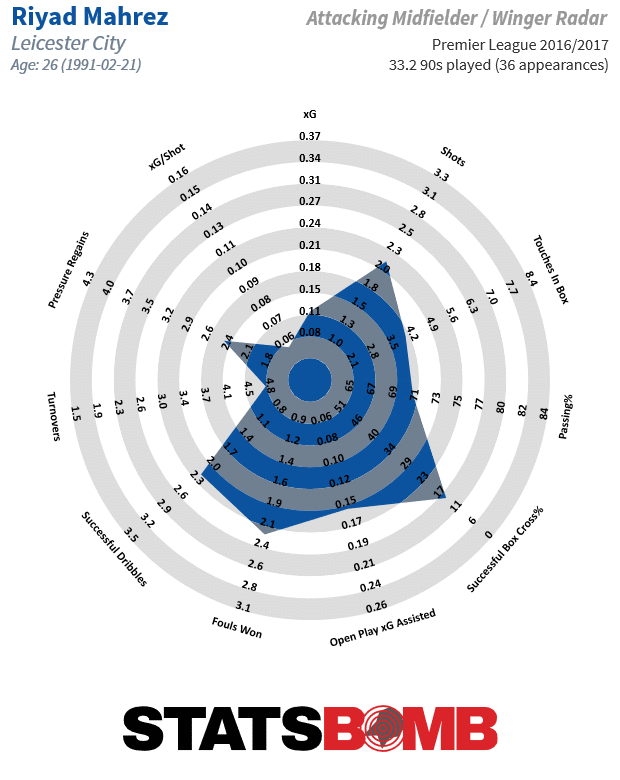 So far this summer in the transfer market, there has been a move to shore up defence with a novel idea: "buy a relegated centre back". Arriving for around £40m, Nathan Aké has long appeared the type of player that could move to a higher level than Bournemouth, not least because he is so comfortable on the ball. As a left footed centre back on the cusp of his peak years, he was a relatively scarce commodity and does actually scope out as a fairly capable defending defender on top of passing reliability. It's hard to see him as a direct upgrade who will slot instantly into City's first eleven, but no doubt he will get minutes, and ease the pressure Laporte had to shoulder as the one natural left sided centre back. There is talk of Kalidou Koulibaly arriving, but at this stage gossip around him is as reliable to the transfer window as Santa Claus is to Christmas, so it's hard to be confident here. If the past was represented by the sad sight of Leroy Sané returning to his homeland, the future is now here in the form of 20 year old Ferran Torres, who arrived from Valencia. His former team struggled extensively in 2019-20, and it had an impact on the numerical impact of much of their squad. As such we have a tricky chicken vs egg problem when evaluating him just from numbers; as we well know, the video is required too:
So far this summer in the transfer market, there has been a move to shore up defence with a novel idea: "buy a relegated centre back". Arriving for around £40m, Nathan Aké has long appeared the type of player that could move to a higher level than Bournemouth, not least because he is so comfortable on the ball. As a left footed centre back on the cusp of his peak years, he was a relatively scarce commodity and does actually scope out as a fairly capable defending defender on top of passing reliability. It's hard to see him as a direct upgrade who will slot instantly into City's first eleven, but no doubt he will get minutes, and ease the pressure Laporte had to shoulder as the one natural left sided centre back. There is talk of Kalidou Koulibaly arriving, but at this stage gossip around him is as reliable to the transfer window as Santa Claus is to Christmas, so it's hard to be confident here. If the past was represented by the sad sight of Leroy Sané returning to his homeland, the future is now here in the form of 20 year old Ferran Torres, who arrived from Valencia. His former team struggled extensively in 2019-20, and it had an impact on the numerical impact of much of their squad. As such we have a tricky chicken vs egg problem when evaluating him just from numbers; as we well know, the video is required too: 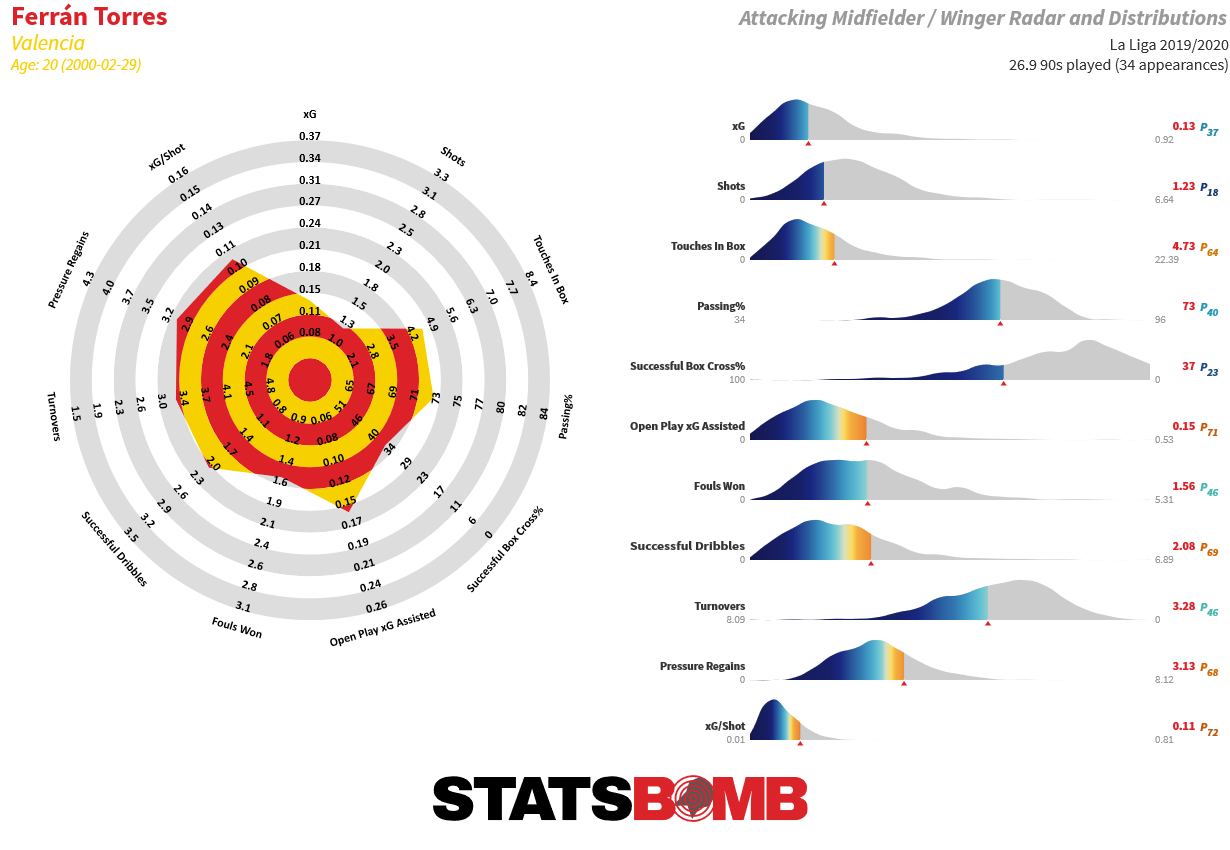 The vast majority of Torres' career has been spent playing off the right side, and how he fits into this team is hard to answer. Raheem Sterling plays off the left, so not there, while the lefties Mahrez and Bernardo Silva tend to operate off the right and Phil Foden is the breakthrough talent already in the squad and covering both these positions. Foden's development really should not be stymied and in particular he shows up extremely well for finding space in the final third. There is likely a positive skew that was assisted by playing often in the post restart fixtures, which were played at a noticeably kinder pace than what came before, but Foden's final third ball receipts were considered "under pressure" on only 6% of his receipts, the lowest in the league by a good margin:
The vast majority of Torres' career has been spent playing off the right side, and how he fits into this team is hard to answer. Raheem Sterling plays off the left, so not there, while the lefties Mahrez and Bernardo Silva tend to operate off the right and Phil Foden is the breakthrough talent already in the squad and covering both these positions. Foden's development really should not be stymied and in particular he shows up extremely well for finding space in the final third. There is likely a positive skew that was assisted by playing often in the post restart fixtures, which were played at a noticeably kinder pace than what came before, but Foden's final third ball receipts were considered "under pressure" on only 6% of his receipts, the lowest in the league by a good margin: 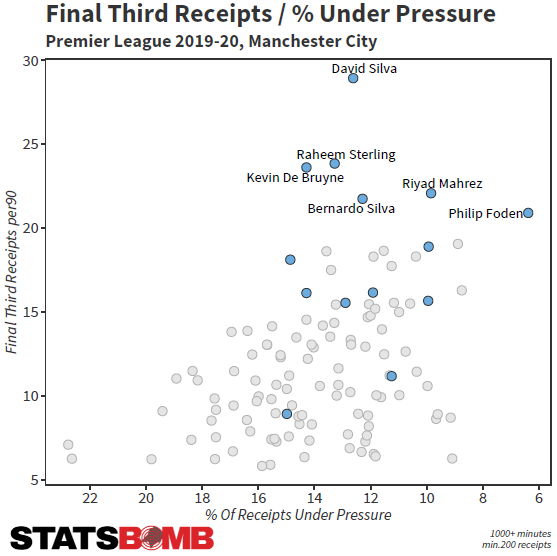 What that chart highlights too is the real hole that has opened up in this squad this summer: the departure of club legend David Silva. Again his presence in midfield last season at 34 years old poses questions about how readily opponents could get through City, but undoubtedly, his on the ball influence was far from dimmed. A rock solid contributor to Guardiola's possession game, and an utterly reliable secondary creator for the team behind De Bruyne, he was still good for 22 league starts last season. Who replaces him? The squad is deep enough to take the hit, but it's not as if a clear answer is wildly evident. Early season we may see some more Guardiola flexibility in selection, this time in midfield rather than just defence. Projection 78, 100, 98, 81 divided by 4 equals 89.25. That's Guardiola's four Manchester City seasons. Sporting Index opened up at 88.5-90 which the eagle eyed amongst you will notice has a midpoint of 89.25. The metrics are still there for this team. They won 26 games last season, and for various reasons ended up towards the bottom end of any realistic point expectation. That doesn't necessarily mean they are primed to overhaul Liverpool who have managed to be consistent as well as dominant in the last two seasons, much as City did before and alongside them in 2017-18 and 2018-19, but they do have the tools. City need to reclaim consistency and perhaps with a crazy schedule for all, Guardiola may be wise to flip the off switch more often when his team are coasting and games are won. Enough of the metrics that undermined City in 2019-20 land in the high variance category, and the functional control this team can still exert over the vast majority of their opponents will surely see them go very deep into the season and contend. Would I bet on them to win it? I don't think so. That's not to say they can't, they are betting favourites with good reason but City have been the metric darlings of nearly every season in the last decade, yet they've won just four titles. You need to be both very good and have things also go your way to win this league. If Guardiola is to leave though, he'll no doubt want to go out on a high.
What that chart highlights too is the real hole that has opened up in this squad this summer: the departure of club legend David Silva. Again his presence in midfield last season at 34 years old poses questions about how readily opponents could get through City, but undoubtedly, his on the ball influence was far from dimmed. A rock solid contributor to Guardiola's possession game, and an utterly reliable secondary creator for the team behind De Bruyne, he was still good for 22 league starts last season. Who replaces him? The squad is deep enough to take the hit, but it's not as if a clear answer is wildly evident. Early season we may see some more Guardiola flexibility in selection, this time in midfield rather than just defence. Projection 78, 100, 98, 81 divided by 4 equals 89.25. That's Guardiola's four Manchester City seasons. Sporting Index opened up at 88.5-90 which the eagle eyed amongst you will notice has a midpoint of 89.25. The metrics are still there for this team. They won 26 games last season, and for various reasons ended up towards the bottom end of any realistic point expectation. That doesn't necessarily mean they are primed to overhaul Liverpool who have managed to be consistent as well as dominant in the last two seasons, much as City did before and alongside them in 2017-18 and 2018-19, but they do have the tools. City need to reclaim consistency and perhaps with a crazy schedule for all, Guardiola may be wise to flip the off switch more often when his team are coasting and games are won. Enough of the metrics that undermined City in 2019-20 land in the high variance category, and the functional control this team can still exert over the vast majority of their opponents will surely see them go very deep into the season and contend. Would I bet on them to win it? I don't think so. That's not to say they can't, they are betting favourites with good reason but City have been the metric darlings of nearly every season in the last decade, yet they've won just four titles. You need to be both very good and have things also go your way to win this league. If Guardiola is to leave though, he'll no doubt want to go out on a high.
If you're a club, media or gambling entity and want to know more about what StatsBomb can do for you, please contact us at Sales@StatsBomb.com We also provide education in this area, so if this taste of football analytics sparked interest, check out our Introduction to Football Analytics course Follow us on twitter in English and Spanish and also on LinkedIn
